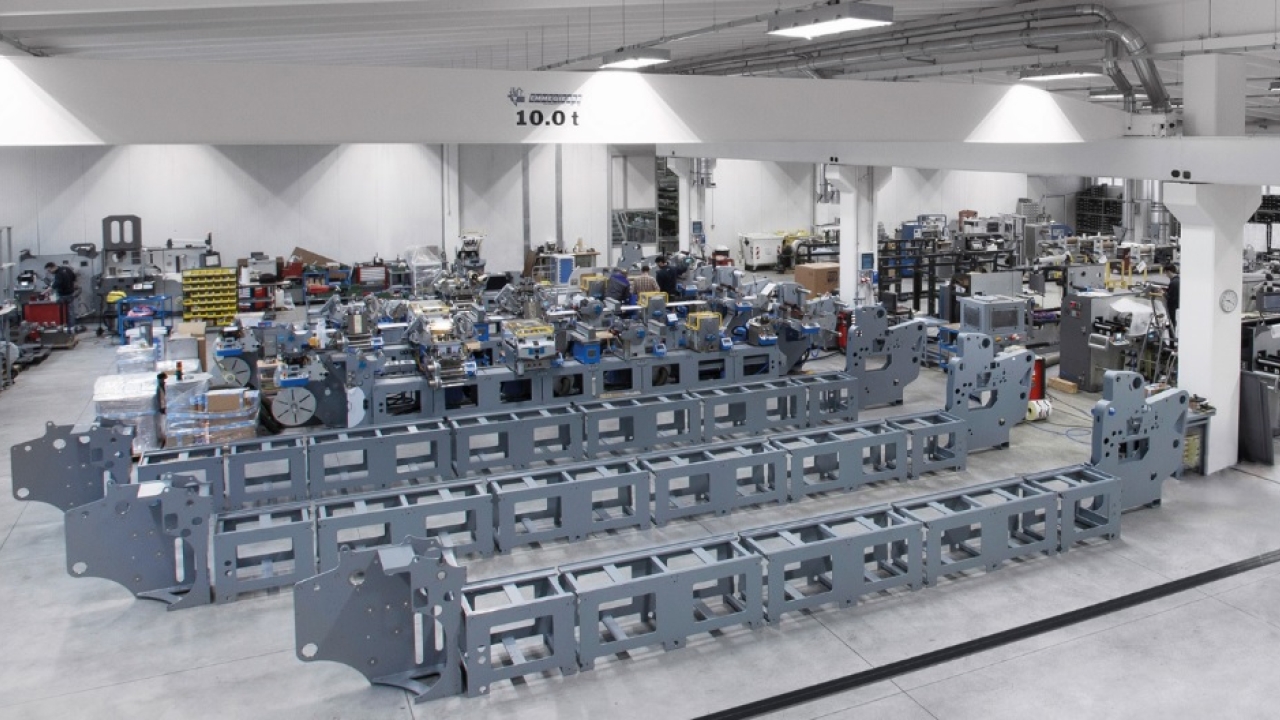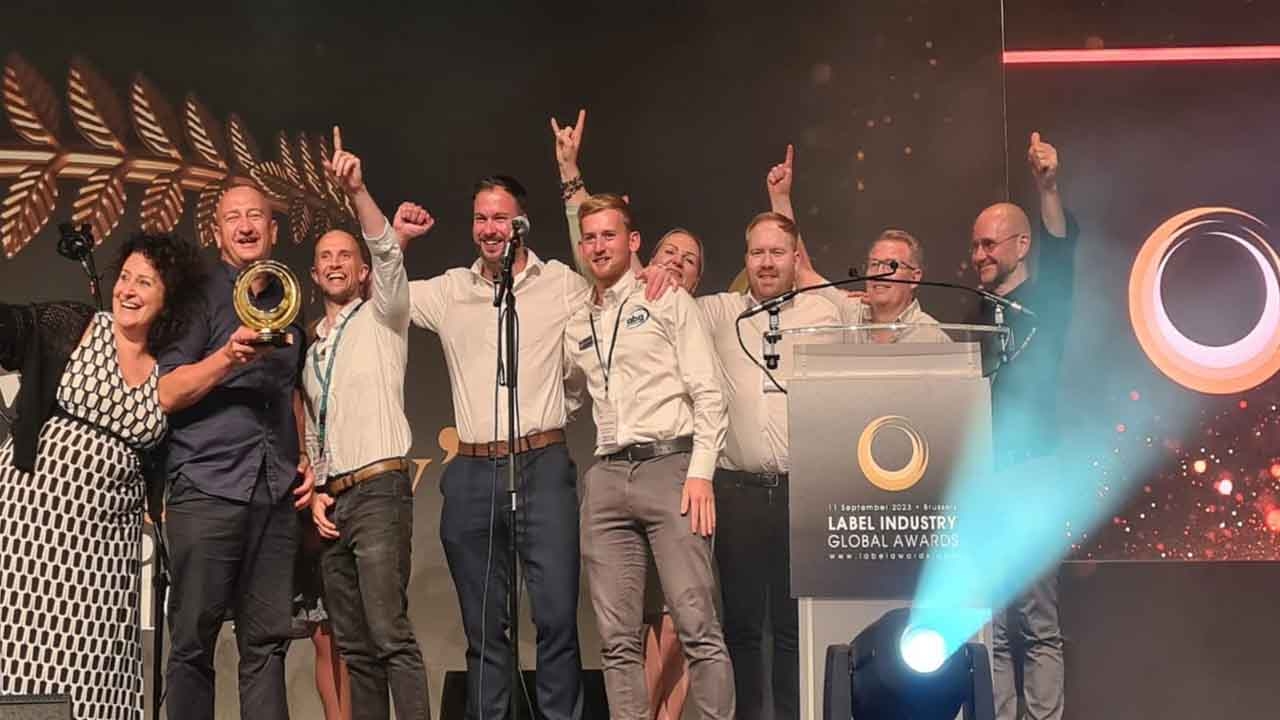Cartes bounces back

Cartes turned this considerable setback to its advantage: not only did it rebuild its factory, it expanded it to 5,400 sqm and redesigned its layout to increase efficiency. The company returned to its upgraded facility in August last year with nine more employees than before the earthquake and a new philosophy of building its machines on a modular platform. In the final months of 2016, in a remarkable feat of productivity, Cartes built 22 machines.
With 42 employees and 14 assembly lines, Cartes manufactures around 70 finishing and converting machines a year. According to sales director Virgilio Micale, who has been with the company for seven years, there has been a 35 percent increase in sales since the shift to modular platform-building. Delivery time is around four months, but Micale says the aim is to reduce it to three: ‘It’s not just a question of space, but of logistics and of streamlining and organizing our processes, which we continue to do since moving back to the refurbished factory.’
Cartes was founded in Moglia in 1970 by Mario Lodi as a manufacturer of textile machines, before moving into the graphics market in 2000. The region is an epicenter of Italian industry, and all materials for machine building are sourced locally. Its original facili ty, located next door to a textile label converter which acts as a Cartes demo center, was where the company back moved to during its relocation following the earthquake.
Around five percent of machines are custom-built. Often the modifications requested by clients are then incorporated into Cartes’ machines as standard. The company has more than 4,000 machines installed worldwide.
Its most popular model – and also its highest- specification machine – is the GT Series. Launched in 2012, more than 150 machines have been installed. Germany is Cartes’ strongest market, followed by Spain, Italy and South America.
In March this year, Cartes bought a 4,000 sqm lot adjacent to its factory, which will allow it to increase significantly its production capabilities in the future.
Gráficas Tomelloso benefits from value-added converting
Spanish label converter Gráficas Tomelloso specializes in the production of high quality wine labels and relies on a fleet of Cartes machines for extensive added-value embellishment.
Based in La Mancha, a region south of Madrid known for its wine production, the converter is Cartes’ biggest client in the graphics sector, with five converting lines from the Italian manufacturer and two more due to be installed by the end of the year.
According to Patricio Morales, who runs the company with his brothers Angel and Julian, 90 percent of Gráficas Tomelloso’s labels involve advanced added-value converting. ‘Most of our labels pass through the Cartes machines,’ he says. ‘For our sector, Cartes offers everything that we need in terms of stamping, die-cutting, varnishing etc at a very high level. All the finishing options are of high quality.’
Gráficas Tomelloso installed its first Cartes finishing line in 2007, and now runs four GT Series machines and one HS Series. The modular machines feature a variety of combinations of hot stamping, embossing, flexo varnishing, semi-rotary die-cutting, silkscreen printing and laser converting. Cartes’ Spanish distributor Impryma, headed by Juan Bosco, handles sales and service.
Virgilio Micale, Cartes sales director, says: ‘For Cartes, Gráficas Tomelloso is a reference point: they have developed an excellent business, producing very high quality labels with added value and excellent register. The quality of their production and the usage of their machines is unequalled.’
During L&L’s visit, Cartes president Mario Lodi was particularly impressed by the efficiency of Gráficas Tomelloso’s plant. All electrical cables and wiring run underneath the factory floor, to improve safety and aesthetics. ‘There are no cables showing,’ says Lodi. ‘I’ve not seen this anywhere else.’
Gráficas Tomelloso is benefitting from strong growth in Spanish wine production. With 38 employees at its 2,800 sqm factory, the converter has been growing consistently at 10 percent a year for most of the past decade, according to Morales, with only two years of slower growth during that time. Gráficas Tomelloso has bought land adjacent to its factory and plans to double production space in the near future.
As well as a large number of local vineyards, the region where Gráficas Tomelloso is based houses some of Spain’s largest producers of alcohol for use in the pharmaceutical and cosmetics industries.
The company was founded in 1992 as a sheet-fed label converter operating Heidelberg presses. It moved into self-adhesive label production in 2005, and today produces wine labels for the wider Spanish market as well as exporting 10 percent of production to France. Its 1,500 clients are mostly vineyards, with some production also taken by labels for Manchego cheese, which is native to La Mancha region.
While Cartes machines provide the labels’ high quality embellishments, materials from Spanish supplier Manter – part of the Fedrigoni Group – are also a crucial part of the premium look desired by Gráficas Tomelloso’s clients. ‘Manter offers a great variety of specialty, added-value papers,’ says Patricio Morales. ‘Their range is unbeatable.’ Some materials are also sourced from Avery Dennison’s Fasson portfolio.
Eighty percent of production is self-adhesive; 20 percent sheet-fed. Gráficas Tomelloso runs three Heidelberg Printmaster sheet-fed offset presses, three HP Indigo WS6800 digital presses, and three Gidue Combat presses. Morales describes the Gidue (now part of Bobst Group) machines – which are 8-color presses with cold stamping, lamination and rotary die-cutting – as ‘versatile and reliable’.
Finishing of digital- and flexo-printed labels takes place on the Cartes machines, plus one from Newfoil. Two older Smag units are to be replaced by the two new Cartes machines being installed later this year. Offset label finishing is handled by four Heidelberg hot stamping units and a Polar cutter.
In-house platemaking uses DuPont Cyrel Fast and Esko CDI Spark equipment for flexo, while a Heidelberg Suprasetter handles offset work.
Gráficas Tomelloso can also count on wide format digital sheet-fed production through Xerox and Heidelberg machines, mainly for wine catalogues which require special finishing.
Stay up to date
Subscribe to the free Label News newsletter and receive the latest content every week. We'll never share your email address.


